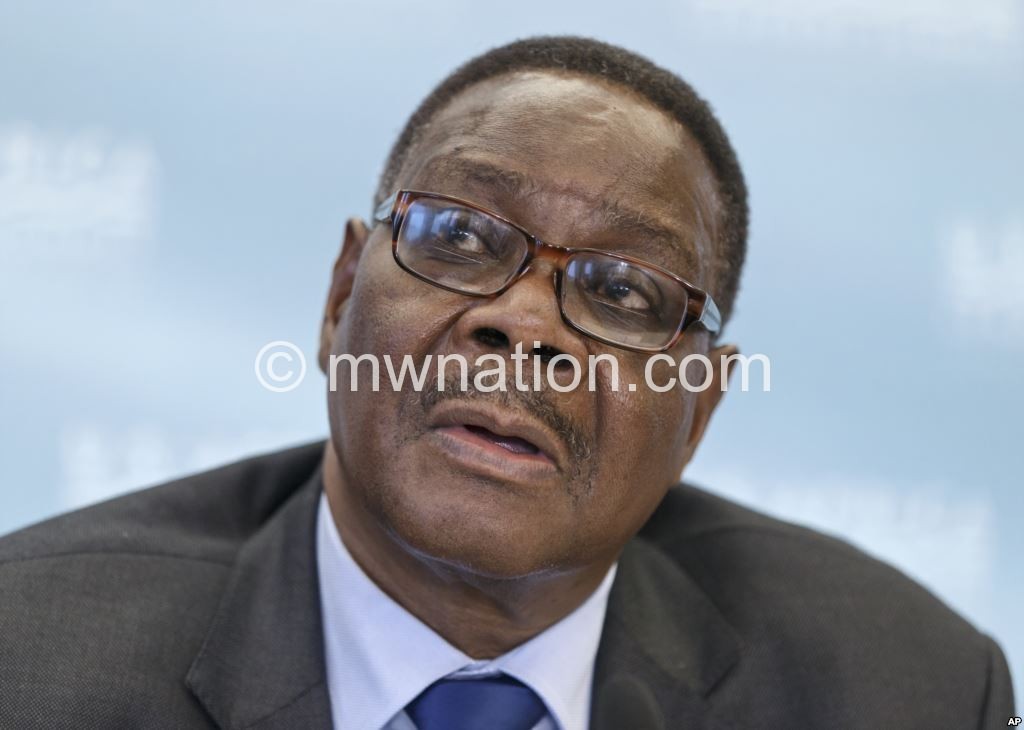APM remarks draw mixed reactions
There are mixed reactions to President Peter Mutharika’s sentiments that the Constitutional Court’s decision to nullify the May 21 presidential election results is a threat to democracy and an attempt to usurp the will of the people.
While a law professor has faulted the President and wondered whether he had read and reflected on the judgement, the Malawi Law Society (MLS) argues that Mutharika was within his rights to make the assessment.
In his special address aired on Malawi Broadcasting Corporation (MBC) on Wednesday night, Mutharika said he considered the judgement delivered by a five-judge panel of the High Court of Malawi sitting as the Constitutional Court as “serious subversion of justice, an attack on the country’s democratic system and an attempt to undermine the will of people”.

He also said the judgement inaugurated the death of Malawi’s democracy.
But Garton Kamchedzera, a professor of law at Chancellor College—a constituent college of the University of Malawi, in an interview yesterday wondered if the President, who is also a professor of law, understands the Constitution and the Parliamentary and Presidential Elections Act.
He also questioned the legal ethics of Mutharika’s legal team which he said was supposed to provide ethical legal counsel to the President.
Said Kamchedzera: “I would be tempted to accuse that [legal] team of legal arrogance. They should have a critical look at it, not only at the judgement, but also at themselves and MEC [Malawi Electoral Commission]. I think they have acted in haste.”
In a separate interview, MLS president Burton Mhango said the President’s comments on the judgement were within his understanding because he is entitled being a party to the proceedings and the decision has affected his position.
He said: “If you are making an appeal to the higher court, which is the right under the Constitution, you must raise grounds. So, according to them, those are the grounds they are looking at and no one is entitled to fault their reading.”
In an interview yesterday, presidential press secretary Mgeme Kalilani said there are several orders and determinations in the judgement that in the President’s view usurp the power and authority of the Legislative and Executive arms of government.
He observed that the situation in the judgement which orders parliamentarians to meet and make certain amendments is an example of usurping the power and authority of Parliament.
Said Kalilani: “The power to call for Parliament is vested in the President in consultation with the Speaker [of Parliament], but here, we have a situation where the court has decided to give itself that power and then exercise that power.
“If you look at such decision, it’s an attack on the democracy, because the foundation of the democracy is principle of separation of power which is under attack here.”
Ironically, Parliament was already scheduled to meet from February 10 to 28 for the Mid-Year Budget Review Meeting.
The five-judge panel comprising Healey Potani, Redson Kapindu, Ivy Kamanga, Mike Tembo and Dingiswayo Madise on Monday nullified the presidential election in the May 21 2019 Tripartite Elections and directed that a fresh election be held within 150 days from February 3 2020.
The court said MEC failed in all constitutional tests it set out on the elections and that the irregularities were so glaring that the credibility of the election was in question.
Two of the presidential candidates in the May 21 2019 Tripartite Elections, UTM Party’s Saulos Chilima (the first petitioner) and Malawi Congress Party candidate Lazarus Chakwera (the second petitioner), asked the court to nullify presidential election results over alleged irregularities, especially in the results management system.
Mutharika of Democratic Progressive Party was the first respondent with MEC as the second respondent. All the five judges voted for the nullification of the election and recommended that Parliament should review the country’s election management laws, particularly the 50-plus-one provision in choosing the President, to clarify on laws governing the declaration of a winner through a majority vote.





